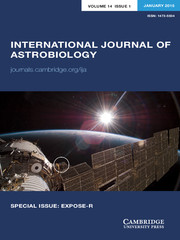Article contents
Evolution through the stochastic dyadic Cantor Set: the uniqueness of mankind in the Universe
Published online by Cambridge University Press: 22 October 2015
Abstract
The search for intelligent life or any type of life involves processes with nonlinear chaotic behaviours throughout the Universe. Through the sensitive dependence condition, chaotic dynamics are also difficult or impossible to duplicate, forecast and predict. Similar evolution patterns will result in completely different outcomes. Even, the intelligent life evolution pattern, based on carbon, DNA–RNA–protein, will differ from all possible sequences. In the present paper, the stochastic dyadic Cantor set models the many possible variations of such chaotic behaviours in the Universe, yielding to a tendency to zero, for any scenario of intelligent life evolution. The probability of the development of the exact microscopic and macroscopic scenario that is capable of supporting intelligent life or any other type of life in any planet is vanishingly small. Thus, the present analysis suggests that mankind, as an extremely statistically uncommon occurrence, is unique and alone in the Universe.
Information
- Type
- Research Article
- Information
- International Journal of Astrobiology , Volume 15 , Special Issue 4: The history and philosophy of the Origin of Life , October 2016 , pp. 319 - 331
- Copyright
- Copyright © Cambridge University Press 2015
References
- 2
- Cited by

